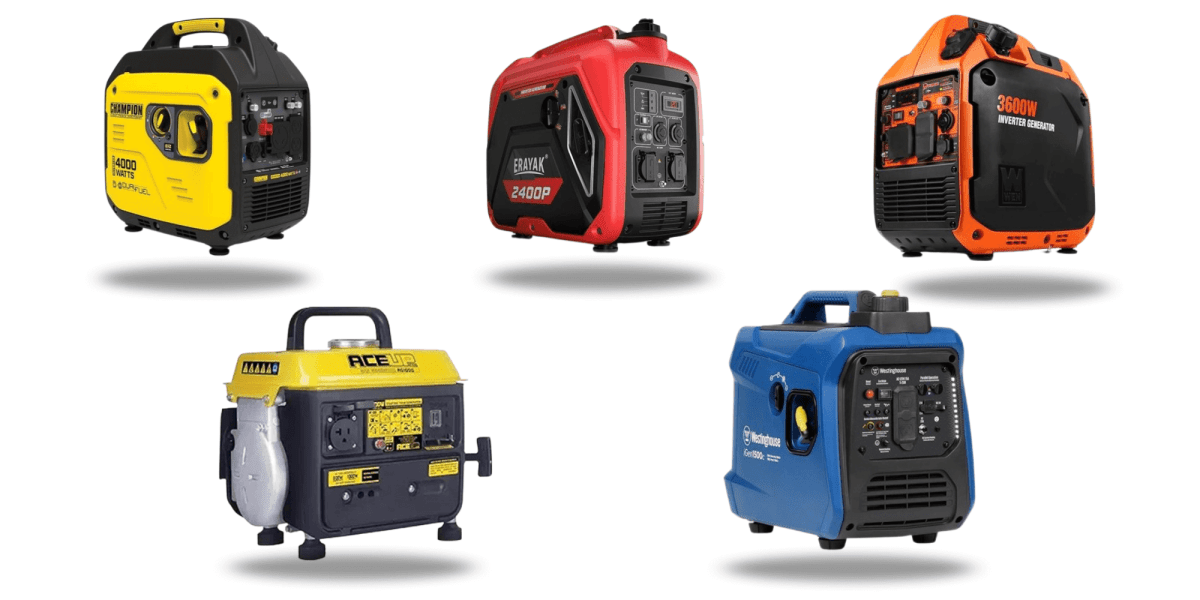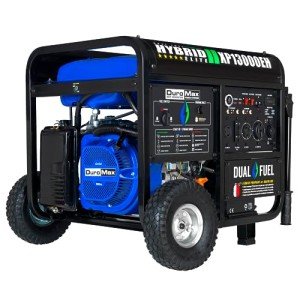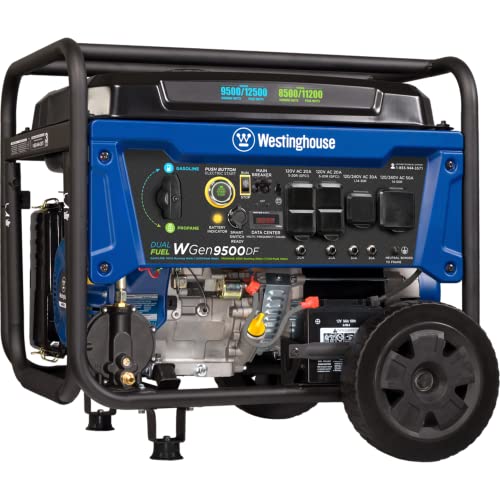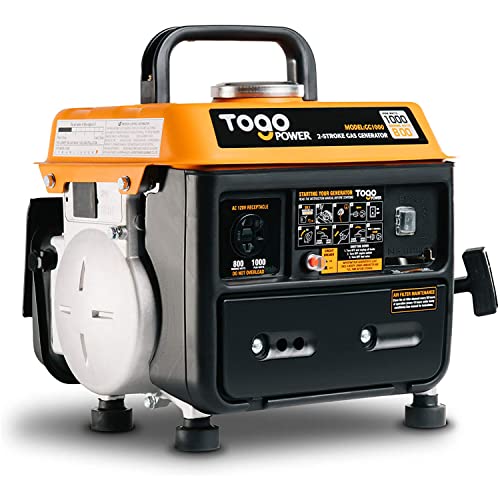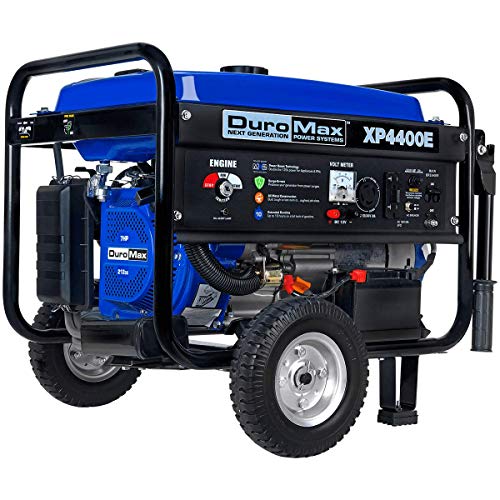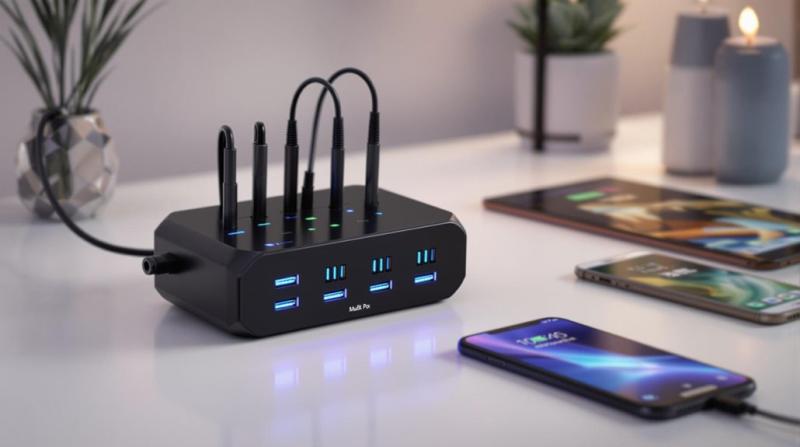Whether you're preparing for emergencies or need reliable power for outdoor activities, choosing the right gasoline power station can make all the difference in your experience. You'll find a vast market of options, from compact 1,000-watt units to robust 4,000-watt powerhouses, each offering unique features and capabilities. While some users might prioritize portability and quiet operation, others need maximum power output and extended runtime. Before you commit to a specific model, let's explore five top-rated gasoline power stations that stand out in 2024, along with the essential factors that should influence your decision.
Key Takeaways
-
Honda EU3000iS delivers 3000 starting watts with exceptional fuel efficiency and operates at a quiet 50-58 dBA noise level.
-
Yamaha EF2200iS provides 2200 starting watts with smart throttle technology and features CO monitoring for enhanced safety.
-
Champion 4500-Watt Dual Fuel offers versatile fuel options, running on both gasoline and propane with built-in surge protection.
-
Westinghouse iGen4500 generates 4500 peak watts, includes remote start capability, and maintains noise levels under 52 dBA.
-
Generac GP3500iO produces 3500 starting watts, features PowerRush technology for 50% higher starting capacity, and weighs only 74 pounds.
Champion 4000-Watt Dual Fuel Portable Inverter Generator
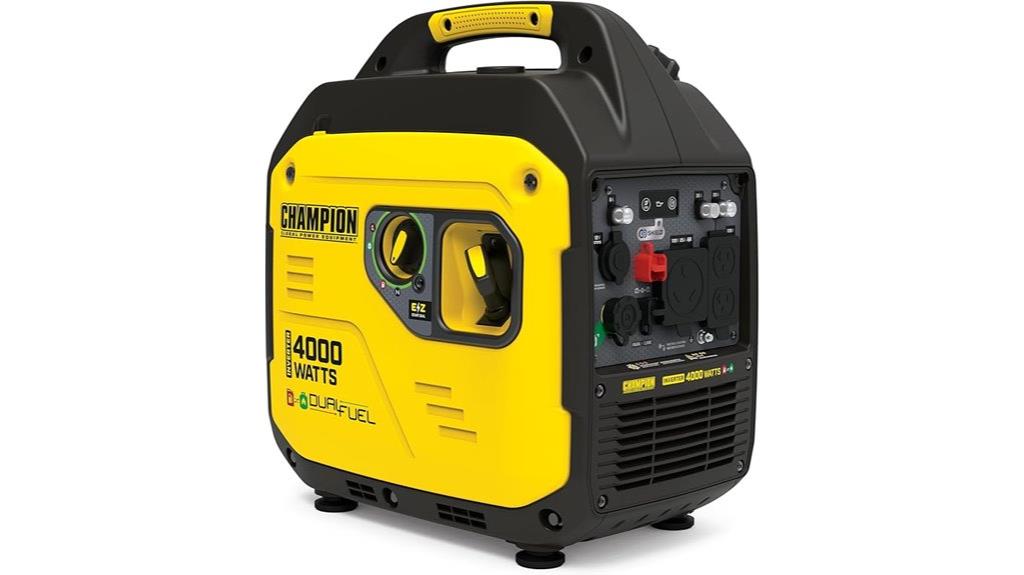
The Champion 4000-Watt Dual Fuel Portable Inverter Generator is ideal for RV owners and outdoor enthusiasts who need reliable, clean power without the bulk. You'll get impressive versatility with its ability to run on either gasoline or propane, delivering up to 4000 starting watts and 3000 running watts on gas, or 2700 running watts on propane.
Safety features make this generator stand out, including the CO Shield technology that automatically shuts off if it detects dangerous carbon monoxide levels. You'll appreciate the EZ Start dial and Cold Start Technology for hassle-free operation in any weather. The generator's quiet 64 dBA operation, combined with its lightweight design under 55 pounds, makes it perfect for camping and outdoor events. With multiple outlets, including a 120V TT-30R for RVs and a standard household duplex outlet, you're covered for various power needs.
Best For: RV owners, campers, and outdoor enthusiasts who need a portable, versatile power source with dual fuel capabilities and clean power output for sensitive electronics.
Pros:
- Dual fuel capability offers flexibility and extended runtime options (up to 25 hours on propane)
- Lightweight design under 55 pounds with quiet operation (64 dBA) makes it ideal for camping
- Advanced safety features including CO Shield technology and clean power output for electronics
Cons:
- Lower running watts on propane (2700W) compared to gasoline (3000W)
- Single TT-30R RV outlet limits multiple RV connections without adapters
- Premium price point compared to non-inverter generators with similar wattage
Aceup Energy 1,000W Portable Gas Generator
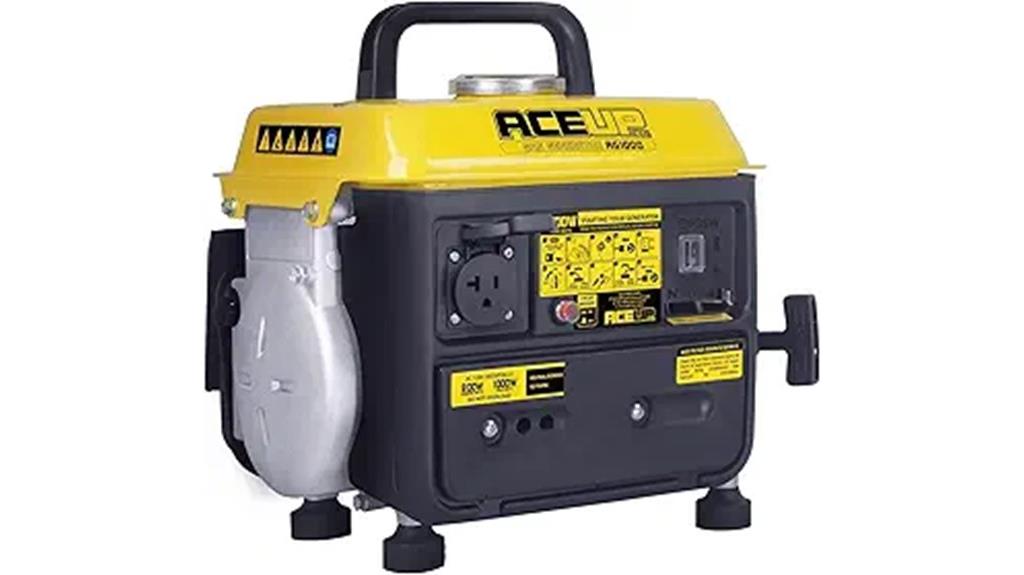
Budget-conscious outdoor enthusiasts will appreciate Aceup Energy's 1,000W portable gas generator, which delivers reliable power in a compact 35-pound package. With 1,000 peak watts and 800 running watts, this generator can power your essential electronics and tools during camping trips or power outages.
You'll get up to 6 hours of runtime at half load from the 1.1-gallon fuel tank, making it suitable for extended outdoor activities. The 71cc two-cycle engine features an air cooling system and recoil start, while the 120V household outlet operates at 60Hz frequency. It's both EPA and CARB compliant, and you'll receive a 1-year limited warranty with free lifetime technical support. While some users report initial starting challenges, these typically resolve after the break-in period, and the generator's overall performance and portability receive positive feedback.
Best For: Budget-conscious campers, outdoor enthusiasts, and homeowners seeking a lightweight, portable backup power source for basic electronics and tools.
Pros:
- Lightweight and compact design at just 35.2 pounds makes it highly portable
- Impressive 6-hour runtime at half load from a modest 1.1-gallon fuel tank
- EPA and CARB compliant with lifetime technical support included
Cons:
- Initial starting issues may require a break-in period
- Limited power output may not support larger appliances or multiple devices
- Two-cycle engine requires oil-gas mixture which can be less convenient than four-cycle engines
ERAYAK 2400W Portable Inverter Generator
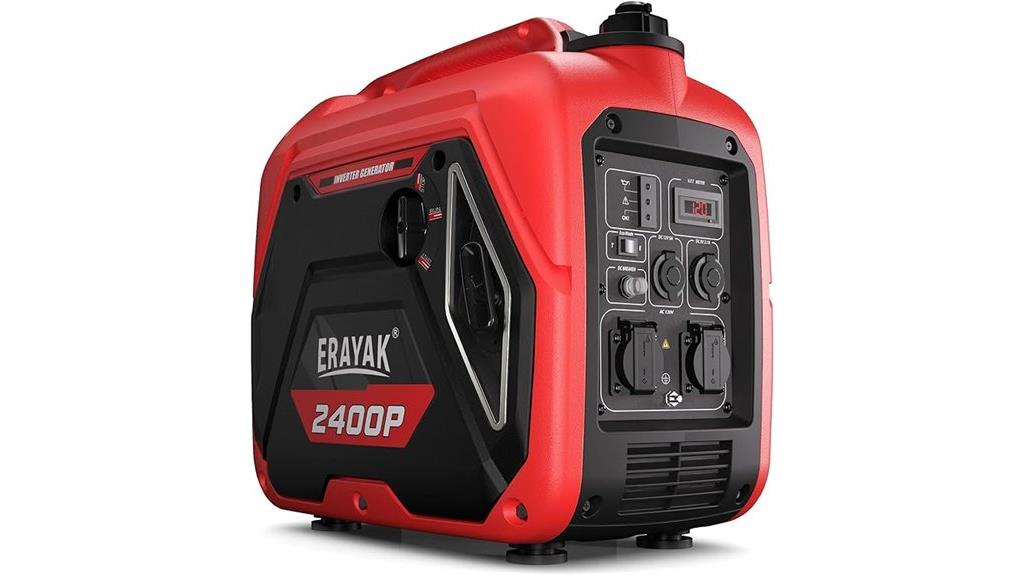
Outdoor enthusiasts seeking reliable, portable power will find the ERAYAK 2400W Portable Inverter Generator hits the sweet spot between performance and portability. With 2,400 starting watts and 1,800 running watts, this inverter generator provides ample power through its two 120V household outlets, 12V DC receptacle, and dual USB ports.
You'll appreciate its user-friendly features, including a lightweight 42-pound design with built-in handle and remarkably quiet 52 dBA operation at quarter load. The generator's Electronic Speed Control mode optimizes fuel efficiency, delivering up to 14.4 hours of runtime on a single 0.95-gallon tank at 25% load. The permanent magnet brushless motor, automatic shut-off system, and Inverter Technology guarantee stable, safe power for your sensitive electronics. A thorough 3-year warranty and lifetime technical support demonstrate ERAYAK's commitment to reliability.
Best For: Campers, RV enthusiasts, and homeowners needing a reliable backup power source for small appliances and electronics while prioritizing portability and quiet operation.
Pros:
- Exceptionally quiet operation at 52 dBA makes it ideal for camping and residential use
- Impressive 14.4-hour runtime on a single tank at 25% load provides extended power
- Lightweight 42-pound design with built-in handle ensures easy transportation
Cons:
- Limited power output may not support larger appliances or multiple devices simultaneously
- Small 0.95-gallon fuel tank requires more frequent refilling at higher loads
- Premium price point compared to non-inverter generators of similar wattage
WEN DF360iX Dual Fuel Portable Inverter Generator (3600W)
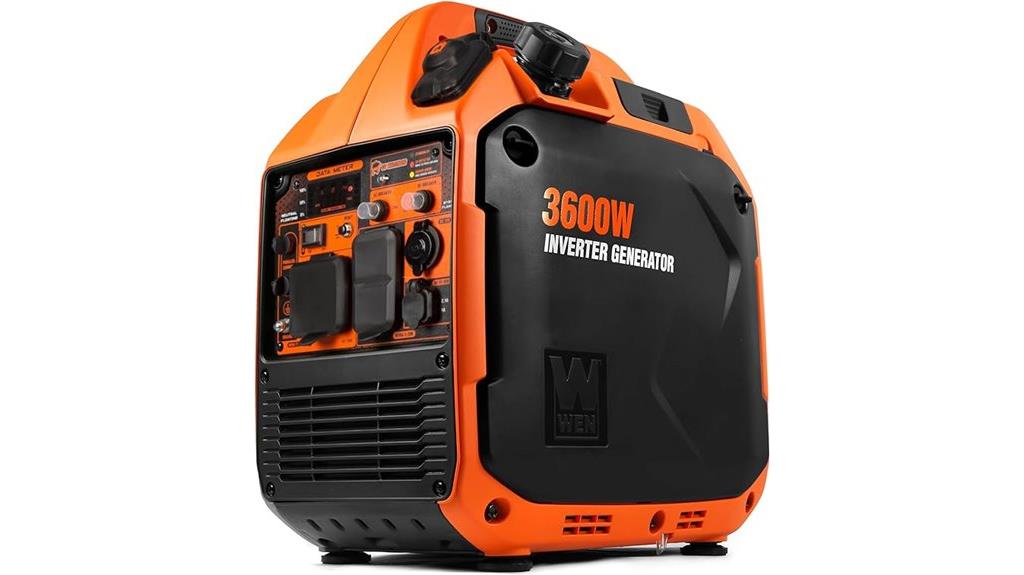
Power-conscious homeowners and RV enthusiasts will appreciate the WEN DF360iX's dual-fuel flexibility, offering 3600 surge watts on gasoline or 3500 watts on propane. You'll enjoy up to 5 hours of runtime on a single 1.5-gallon tank of gas, or extend your power needs to 14 hours using a 20-pound propane tank.
The generator's 149cc 4-stroke engine delivers clean power at a quiet 65 decibels, making it ideal for camping or backup power situations. You'll find plenty of outlet options, including two 120V receptacles, an RV-ready port, USB ports, and a 12V DC outlet. The unit's compact 49-pound design and built-in safety features, like the CO shutdown sensor and fuel shutoff function, make it both portable and reliable. For added peace of mind, you're covered by a 3-year warranty with nationwide service support.
Best For: Homeowners seeking versatile emergency backup power and RV campers who need a reliable, portable generator with dual-fuel capability and clean power output for sensitive electronics.
Pros:
- Dual-fuel capability provides flexibility and extended runtime options (up to 14 hours on propane)
- Quiet operation at 65 decibels makes it suitable for camping and residential use
- Comprehensive outlet selection including RV-ready port and USB connections
Cons:
- Relatively small gas tank capacity at 1.5 gallons limits runtime on gasoline
- Lower power output when running on propane compared to gasoline
- At 49 pounds, may still be heavy for some users to transport single-handedly
Westinghouse 1500W Portable Inverter Generator
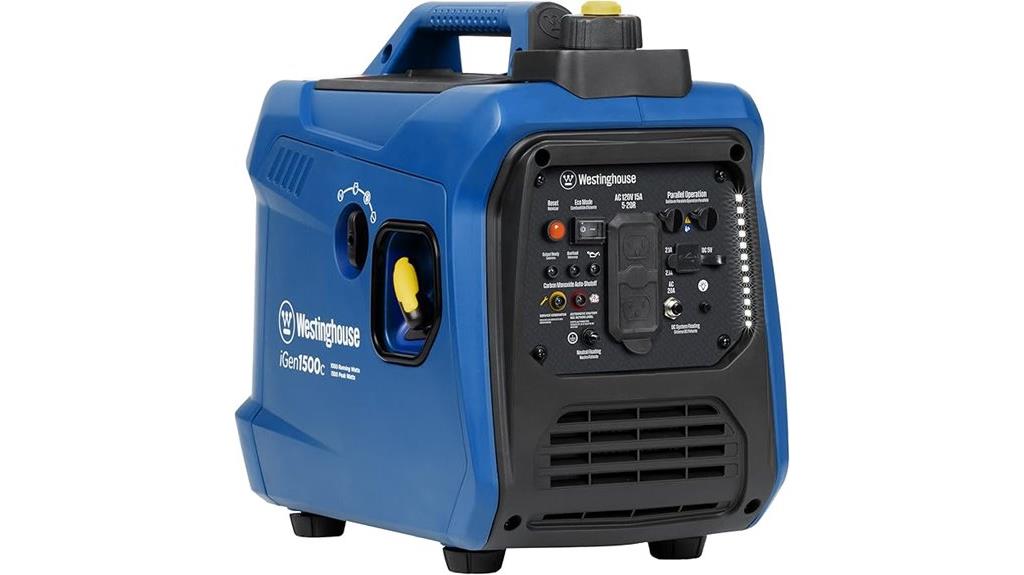
Small-space adventurers will appreciate the Westinghouse 1500W Portable Inverter Generator's compact yet powerful design. At just 33 pounds, you'll find it easy to transport, while its 1500 peak watts and 1000 running watts provide reliable power for essential needs. The generator's efficiency stands out with a 12-hour run time on a modest 0.79-gallon gas tank, and its Economy Mode helps maximize fuel consumption.
You'll enjoy the generator's quiet operation at 52 dBA, making it suitable for camping or home backup power. It comes equipped with two 120V 20 Amp outlets and two USB ports, offering versatile charging options. The built-in safety features, including low oil shutdown and overload protection, guarantee worry-free operation, while the 3-year warranty coverage provides peace of mind. Customer reviews consistently praise its performance, with a strong 4.5/5 rating from over 1,000 users.
Best For: Outdoor enthusiasts, campers, and homeowners needing a lightweight, quiet portable power solution for small appliances and electronics.
Pros:
- Exceptionally quiet operation at 52 dBA makes it ideal for camping and residential use
- Impressive 12-hour run time from a small gas tank with fuel-efficient Economy Mode
- Lightweight and portable at 33 pounds with comprehensive safety features and warranty coverage
Cons:
- Limited power output may not support larger appliances or multiple devices simultaneously
- Single fuel type (gas only) limits fuel options compared to dual-fuel generators
- Higher price point compared to non-inverter generators of similar wattage
Factors to Consider When Choosing Gasoline Power Stations
When you're in the market for a gasoline power station, you'll need to ponder several key factors that will impact your overall satisfaction and the unit's effectiveness. Your initial focus should be on matching the power output requirements to your specific needs, while also evaluating practical aspects like runtime, fuel capacity, and noise levels. The unit's portability, weight, and built-in safety features will ultimately determine how well it serves your purposes, whether you're planning to use it for camping trips or emergency home backup.
Power Output Requirements
A gasoline generator's power output capabilities directly determine its ability to fulfill your electrical needs. When selecting a power station, you'll need to carefully assess both the starting and running wattage requirements of your devices and appliances. Starting wattage, often higher than running wattage, refers to the initial power surge needed to start electrical equipment, while running wattage is the continuous power required during operation.
To determine your power requirements, make a list of all devices you plan to run simultaneously and add up their wattage needs. Don't forget to account for surge watts, which can be substantially higher than running watts, especially for devices with motors like refrigerators or air conditioners. You'll want to choose a generator that can handle both your total running watts and the highest potential surge requirement.
It's always better to select a generator with more power capacity than you think you'll need. This extra headroom guarantees your generator won't struggle under heavy loads and provides flexibility for adding more devices. A generator operating near its maximum capacity may not perform as efficiently or reliably as one running at moderate levels.
Runtime and Fuel Capacity
Throughout your search for the ideal gasoline power station, runtime and fuel capacity should rank among your top deliberations. The fuel tank size, which typically ranges from 0.8 to 2 gallons or more, directly impacts how long you'll be able to run your generator without refueling. You'll want to carefully evaluate your power needs and intended usage duration to select an appropriate tank capacity.
When examining runtime capabilities, you'll need to contemplate that fuel consumption varies substantially based on your power demands. At half load, most units consume between 0.4 and 0.8 gallons per hour, delivering runtimes of 5 to 14 hours depending on tank size and efficiency settings. If you're looking for extended operation periods, you might want to explore dual-fuel models that can run on both gasoline and propane, as propane typically offers longer continuous runtime per tank. Additionally, many modern generators include eco-mode settings that can help optimize fuel efficiency when you're not using the unit at full capacity. Remember that factors like engine size and load will influence your actual runtime, so it's crucial to choose a model that aligns with your specific needs.
Noise Level Assessment
Noise levels stand out as a critical examination when selecting a gasoline power station, particularly if you'll be using it in noise-sensitive environments. When evaluating power stations, you'll want to pay attention to their decibel ratings, which are typically measured in dBA from a distance of 23 feet. Modern inverter generators often operate at noise levels below 60 dBA, making them ideal for residential areas and camping situations.
You'll need to examine several factors that influence noise output. The generator's engine displacement plays a crucial role, with larger engines generally producing more noise. The muffler design can also make a substantial difference in sound reduction, while the operational load affects noise levels during use. If you're looking for the quietest options, focus on inverter models that can operate as low as 50 dBA, though keep in mind that higher-power units may exceed 70 dBA. When comparing different models, make sure you're looking at noise ratings measured under similar conditions to make an accurate assessment. Remember that every 10 dB increase represents a doubling of perceived loudness, so even small differences in ratings can remarkably impact user experience.
Portability and Weight
Portability and weight considerations sit at the forefront of selecting an effective gasoline power station, especially if you'll need to move your unit frequently. When choosing your power station, you'll want to look for models that weigh less than 55 pounds, making them manageable for transport and setup without causing excessive strain.
Inverter generators are often your best bet for prime portability, as they incorporate advanced technology that allows for a lighter design compared to conventional generators. You'll find that their compact and streamlined construction contributes greatly to ease of movement, which becomes vital when you're frequently relocating your power source. While evaluating different models, pay attention to the unit's overall dimensions and any built-in features that enhance mobility, such as wheels or sturdy carrying handles.
Remember that the lighter weight shouldn't come at the expense of power output or durability. You'll need to strike a balance between portability and performance based on your specific needs. Consider how often you'll need to move the generator and the terrain where you'll be using it, as these factors will influence your ideal weight range.
Safety Features Evaluation
While portable design matters, safety features represent the cornerstone of any reliable gasoline power station. You'll want to guarantee your unit includes critical protective elements that safeguard both you and your equipment during operation.
A carbon monoxide automatic shut-off sensor should be at the top of your checklist, as this feature will immediately power down the generator if dangerous gas levels are detected. Similarly, look for models equipped with low oil shutdown capabilities, which prevent engine damage and reduce fire risks by cutting power when oil levels drop too low.
When it comes to protecting your electronics, you'll need two essential features: overload protection circuitry and inverter technology. The former prevents dangerous power surges from damaging your devices, while inverter technology delivers clean, stable power that's safe for sensitive equipment like laptops and smartphones.
Don't overlook noise levels in your safety considerations. You should select a power station that operates below 70 dBA, ensuring safe operation during extended periods of use. This noise threshold helps protect your hearing while maintaining comfortable conditions in your working environment.
Outlet Types Available
Power versatility stands at the forefront of any quality gasoline generator, with outlet configurations determining what devices you'll be able to connect and use. Most modern gasoline power stations come equipped with standard 120V household outlets, which you'll find indispensable for powering common appliances and tools. You'll also typically find 12V DC outlets and USB ports, making these units flexible enough to charge your mobile devices and other portable electronics.
If you're planning to power larger equipment or need to connect your RV, you'll want to look for models featuring specialized outlets. Many high-capacity units offer 30A RV receptacles or 240V outlets, which can handle more demanding power requirements. For those who'll be using sensitive electronics, you should consider inverter generators, as they're specifically designed to deliver clean, stable power through their specialized outlets.
When you're selecting a gasoline power station, it's vital to match the outlet types to your specific needs. Take inventory of the devices you'll need to power, and guarantee your chosen generator provides not only the right outlet configurations but also sufficient power capacity for your requirements.
Dual Fuel Capabilities
Featuring dual fuel capabilities, modern gasoline power stations offer enhanced versatility through their ability to run on both gasoline and propane. This flexibility provides you with a reliable backup option when one fuel source becomes scarce or cost-prohibitive. You'll find this dual-fuel feature particularly valuable during extended power outages or emergency situations.
When you're considering a dual fuel power station, it is crucial to remember that propane operation typically yields longer runtime compared to gasoline, though you'll experience a slight reduction in power output - usually between 10-15% for both starting and running watts. This power difference means you'll need to carefully evaluate your equipment's requirements when switching between fuel sources. For instance, if you're powering sensitive electronics or high-demand appliances, you'll want to account for this variation in your calculations.
You'll also need to maintain proper storage and handling practices for both fuel types to achieve optimal performance. While gasoline requires stabilizers and regular rotation, propane can be stored indefinitely, giving you greater flexibility in your fuel management strategy.
Cold Start Performance
Beyond fuel flexibility, your generator's cold start performance can make the difference between reliable power and frustrating failure during winter months. When evaluating power stations, you'll want to pay close attention to their cold weather capabilities, particularly if you live in an area prone to freezing temperatures.
Look for generators equipped with advanced ignition systems and cold start technology, as these features greatly improve starting reliability in chilly conditions. The engine's displacement and fuel system design play vital roles in cold weather performance, so you'll want to review these specifications carefully. You can enhance your generator's cold start abilities by following proper maintenance protocols, including using winter-grade oil and keeping the fuel system clean and well-maintained.
Before making your purchase, check the manufacturer's temperature ratings to certify the generator meets your climate needs. You'll find these specifications in the product documentation or technical manual. Remember that a generator's cold start capability isn't just about convenience - it's about certifying your backup power source won't let you down when temperatures drop and you need it most.
Frequently Asked Questions
How Often Should I Change the Oil in My Portable Generator?
You should change your portable generator's oil every 50-100 operating hours or at least once per year. For new generators, change the oil after the first 20 hours of use for ideal performance.
Can I Run My Generator During Rainy Weather?
No, you shouldn't run your generator in rain without proper protection. You'll need a generator tent, canopy, or steel enclosure to prevent electrical hazards. Keep it at least 15 feet from your home.
What's the Average Lifespan of a Portable Gasoline Generator?
Like a reliable car that needs regular care, your portable generator can last 10-15 years with proper maintenance. You'll get between 1,000 to 2,000 running hours if you're diligent about oil changes and servicing.
Is It Safe to Power Medical Devices With a Portable Generator?
You shouldn't power medical devices directly with a generator unless it's specifically designed for medical backup. Use a medical-grade UPS or transfer switch to protect against power fluctuations and guarantee your safety.
Can Multiple Generators Be Connected Together for Increased Power Output?
You can connect multiple generators in parallel using a parallel kit or transfer switch, but they must be identical models with matching voltage and phase. It's not recommended without proper expertise and equipment.
Conclusion
When choosing your ideal gasoline power station, you'll need to balance power output, runtime, and portability with your specific needs. Notably, inverter generators can reduce total harmonic distortion to less than 3%, compared to 25% or higher in conventional generators, making them safer for sensitive electronics. Whether you're looking for a compact 1,000W unit or a robust 4,000W dual-fuel system, today's market offers reliable options with advanced safety features and efficient operation.
